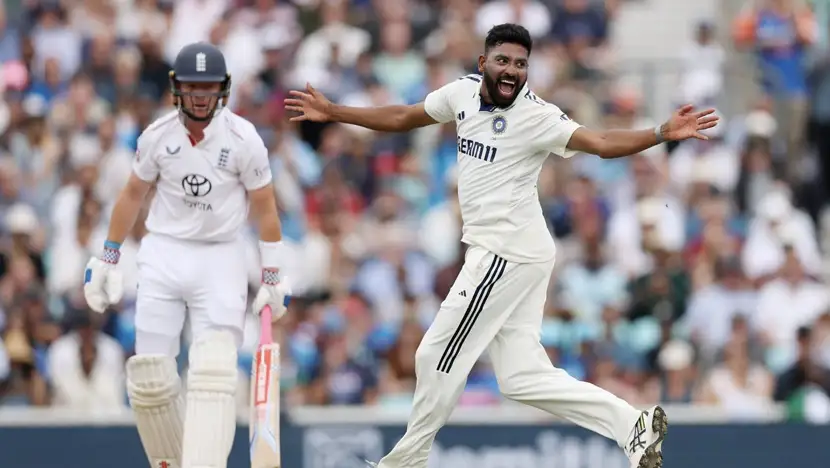In a contest that will live long in cricketing folklore, India pulled off a stunning six-run victory over England at The Oval on Monday, leveling the five-Test Anderson–Tendulkar Trophy 2-2. The result, shaped by grit, late-order heroics, and a relentless bowling effort, has already been hailed as one of the greatest Test matches in modern history.
The stage was set for a dramatic finale. England resumed the final morning needing just 35 runs with four wickets in hand, chasing 374. With Joe Root’s century and Harry Brook’s counterpunch still fresh from Day Four, the hosts looked favourites. Yet, under the leadership of 25-year-old debutant captain Shubman Gill, India displayed the resilience and composure that defined their campaign.
Morning Collapse Seals England’s Fate
Day Four had ended with the balance finely poised: England at 339 for 6, tantalisingly close but vulnerable. Chris Woakes, nursing a dislocated shoulder and unable to bowl, walked out in a sling on Monday purely as a symbolic figure of defiance.
Mohammed Siraj, however, had other ideas. The Hyderabad pacer struck early, dismissing Jamie Smith and sparking an English collapse. Each passing over ratcheted up the tension inside The Oval. Gus Atkinson attempted to shepherd the tail but perished trying to break free.
Atkinson, England’s last hope, faced a searing yorker from Siraj that cannoned into his stumps. The Oval erupted in a mix of disbelief and admiration. India had clinched victory by six runs—England’s narrowest defeat by runs in their Test history.
Siraj, Sundar, and Krishna Script India’s Comeback
Siraj was the undisputed hero of the day. His five for 104 in the second innings took his match haul to nine wickets, crowning a series in which he claimed 23 dismissals, often carrying India’s attack in Jasprit Bumrah’s intermittent absence. His final delivery, a perfect yorker to Atkinson, will be remembered as a defining moment in Test cricket.
Equally vital was Washington Sundar’s fearless batting late on Day Four. With India’s second innings threatening to fold, Sundar’s counter-attacking 53 off 46 balls, laced with four boundaries and four sixes, turned the tide. His 39-run last-wicket stand with Prasidh Krishna in just 25 balls stretched India’s lead to a defendable margin.
Krishna himself emerged as one of the match's revelations. Returning after being overlooked earlier in the series, he claimed eight wickets across both innings. Karnataka coach Yere Goud described him as a “match-winner,” praising his mental toughness amid criticism.
Gill’s First Steps as India’s Leader
For Shubman Gill, this was no ordinary assignment. Tasked with leading India in the wake of Virat Kohli and Rohit Sharma’s retirements, the young captain produced a series that felt like the dawn of a new era. Gill amassed 754 runs at an average north of 75, registering four centuries. His calm authority drew plaudits from teammates, pundits, and even opponents.
By retaining the Anderson–Tendulkar Trophy, which replaced the Pataudi Trophy this year, Gill has already etched his name into Indian cricket’s leadership chronicles.
England’s Bright Sparks and Bazball Questions
Despite the heartbreak, England had their heroes. Harry Brook’s 111 and Joe Root’s 105 in the fourth innings almost carried them home. Brook was named England’s Player of the Series, emblematic of the attacking philosophy championed by coach Brendon McCullum and captain Ben Stokes.
Yet, the loss again exposed the fragility of “Bazball” when under extreme pressure. With Stokes absent through injury and Woakes half-fit, England lacked the leadership depth to close out a match that seemed within reach. McCullum admitted as much post-match, calling the series “one of the all-time greats” but conceding that “we must learn to finish better.”
A Series That Rekindled Test Cricket’s Soul
The 2-2 draw was more than a result—it was a reaffirmation of Test cricket’s vitality. Commentators compared its intensity to the iconic 2005 Ashes. A Times editorial called it “living proof that the long form of the game remains cricket’s highest art,” and criticized administrators for trimming five-Test series to make space for franchise T20 leagues.
India’s triumph, despite the absence of stalwarts such as Kohli, Rohit, Bumrah (in patches), and Ashwin, spoke volumes about their bench strength. For England, it was another reminder that innovation must be balanced with resilience.
Final Scorecard
India: 224 & 396 (Jaiswal 118, Sundar 53)
England: 247 & 367 (Brook 111, Root 105)
Result: India won by 6 runs
Series: Drawn 2–2; India retain Anderson–Tendulkar Trophy
